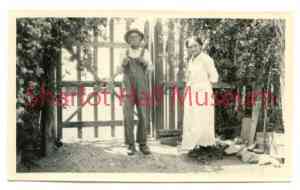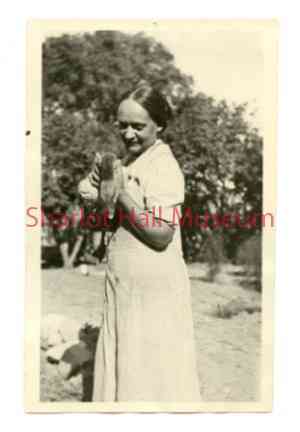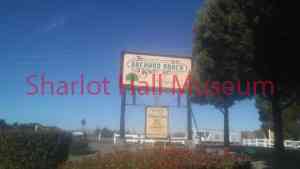By Tom Schmidt
Sharlot Mabridth Hall’s public life has been discussed in great detail. She is remembered as the founder of the Sharlot Hall Museum, Arizona’s first territorial historian, an advocate for Arizona statehood and preserving history, and a poet. However, Sharlot’s life at Orchard Ranch (located on today’s Highway 69 east of Prescott Valley) is the subject of this article. It was here that Sharlot lived a strenuous life as a woman rancher while caring for her parents, Adeline (Boblett) Hall and James Hall.
 Born in Kansas in 1870, Sharlot had experienced a challenging pioneer life since her childhood. In Kansas, the Halls faced cold winters, grasshopper plagues, prairie fires, and raids by Comanche Indians. Her mother, Adeline, had brothers who moved to Arizona in 1864 shortly after it became an organized territory and wrote letters to her, urging her and James to join them. In 1882, the family left Kansas by covered wagon and crossed the Santa Fe Trail bound for Arizona, settling on Lynx Creek.
Born in Kansas in 1870, Sharlot had experienced a challenging pioneer life since her childhood. In Kansas, the Halls faced cold winters, grasshopper plagues, prairie fires, and raids by Comanche Indians. Her mother, Adeline, had brothers who moved to Arizona in 1864 shortly after it became an organized territory and wrote letters to her, urging her and James to join them. In 1882, the family left Kansas by covered wagon and crossed the Santa Fe Trail bound for Arizona, settling on Lynx Creek.
At first, Sharlot’s father worked a hydraulic gold mining operation on Lynx Creek. However, in 1890, he purchased 130 acres above the junction of the Agua Fria River and Lynx Creek and built a ranch, which would become known as Orchard Ranch. There, the Halls raised pigs, horses, and cattle and grew vegetables and fruits, including apples and pears. Their livestock carried the Wine Glass brand, a California brand that James bought and registered in Arizona Territory. Orchard Ranch would serve as Sharlot Hall’s home until 1927.
Sharlot’s poems reflected the hardships of ranch life and the first-hand experiences of being a “ranch woman” on Orchard Ranch, as well as her love of nature. Her book, Poems of a Ranch Woman (published after her death in 1943), reflects both the challenges and happiness of ranch life, especially for women expected to perform domestic chores and maintain a ranch. In the poem “Ranch Woman’s Prayer,” she offers a prayer to Heaven for protection from nature’s harsh elements:
Released once more from sun and heat
Across the mesas dim and cool,
I hear the cattle come to drink
From out the shallow, earth-rimmed pool.
They sigh in grateful, dumb content.
The day-long thirst is healed at last.
And through the water splashed with hoofs
It seems a healing angel passed.
 In “Smell of Rain,” Hall captures the eagerness of both animals and people living on the ranch for a storm to drench the drought-stricken landscape: “Then, at last, a cool dawn wind / Pitying and deeply kind, / Brings a far-off scent of rain. / Ah, the sick earth lives again!” The poem “Drouth Time” also conveys the anxiety about droughts and harsh weather and their effects on the land. “When Ma Turned the Stampede” tells of a ranch mother riding on horseback to desperately turn away a cattle stampede bearing down on her children as they return from school. It should be noted that during her residence at Orchard Ranch, Sharlot wrote the patriotic and well-known poem “Arizona” (featured in her book Cactus and Pine) which helped sway Congress to grant Arizona separate statehood from New Mexico in 1912.
In “Smell of Rain,” Hall captures the eagerness of both animals and people living on the ranch for a storm to drench the drought-stricken landscape: “Then, at last, a cool dawn wind / Pitying and deeply kind, / Brings a far-off scent of rain. / Ah, the sick earth lives again!” The poem “Drouth Time” also conveys the anxiety about droughts and harsh weather and their effects on the land. “When Ma Turned the Stampede” tells of a ranch mother riding on horseback to desperately turn away a cattle stampede bearing down on her children as they return from school. It should be noted that during her residence at Orchard Ranch, Sharlot wrote the patriotic and well-known poem “Arizona” (featured in her book Cactus and Pine) which helped sway Congress to grant Arizona separate statehood from New Mexico in 1912.
In 1927, following the deaths of her parents, Sharlot sold Orchard Ranch. She moved her collections into the 1864 log Governor’s Mansion in Prescott, which she opened the next year as a museum (later named the Sharlot Hall Museum). The influential Fain family acquired much of the original ranch acreage.
 Today, the Hall ranch house is gone, but there is a historic marker and exhibit kiosk at the entrance of Orchard RV Ranch, a mobile home park on the north side of Highway 69 between Prescott Valley and Dewey. The marker reads: “Life on the ranch installed in Sharlot a love of Arizona’s pioneer ways.” There are relics highlighting the Halls’ stay, including a cabin called the “Heritage House” made of original wood from the Hall home, built as a partnership between the Sharlot Hall Museum, the Prescott Valley Historical Society, and a local chapter of the Daughters of the American Revolution. Quite understandably, the RV park residents maintain the kiosk as a sign of their pride in the importance of the property’s history.
Today, the Hall ranch house is gone, but there is a historic marker and exhibit kiosk at the entrance of Orchard RV Ranch, a mobile home park on the north side of Highway 69 between Prescott Valley and Dewey. The marker reads: “Life on the ranch installed in Sharlot a love of Arizona’s pioneer ways.” There are relics highlighting the Halls’ stay, including a cabin called the “Heritage House” made of original wood from the Hall home, built as a partnership between the Sharlot Hall Museum, the Prescott Valley Historical Society, and a local chapter of the Daughters of the American Revolution. Quite understandably, the RV park residents maintain the kiosk as a sign of their pride in the importance of the property’s history.
Visitors can view original photographs and documents belonging to Sharlot M. Hall’s archival collection at the Sharlot Hall Museum Library & Archives. The Library & Archives is open to the public Wednesday-Friday 12 pm to 4 pm and Saturday 10 am to 2 pm.
“Days Past” is a collaborative project of the Sharlot Hall Museum and the Prescott Corral of Westerners International (www.prescottcorral.org). This and other Days Past articles are also available at https://sharlothallmuseum.org/articles/days-past-articles. The public is encouraged to submit proposed articles and inquiries to dayspast@sharlothallmuseum.org. Please contact SHM Library & Archives reference desk at 928-445-3122 Ext. 2, or via email at archivesrequest@sharlothallmuseum.org for information or assistance with photo requests.


